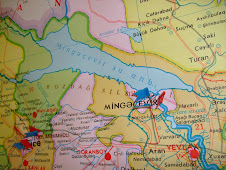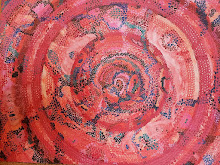This past Saturday I gave a presentation to over 100 Azerbaijani students on American Ethnic and National Diversity and American Youth. I was helped by two PCV friends, Chris and Colleen, and the whole presentation was under one hour. Overall, I think the presentation went over really really well, but I will try to impart to you what giving a presentation, such as ours, is actually like.
First of all, I should say that the presentation was given at the American Center at the Languages University in Baku. The presentation was part of a series of a events called American Days in which different speakers come in to speak about a variety of subjects. The event is hosted by the university and also on behalf of the US Embassy. The American Center was small, but very nice and filled things that are legitimately American like art books on abstract expressionism and Rolling Stone magazines.
Again, the center was actually rather packed. We had no idea how many people we'd be presenting in front of. I think there were about 200 students there initially, but by the time we presented maybe 50-100 of them left. Hard to say. The crowd was mostly receptive...I even saw one girl wearing an American flay scarf around her neck. It is an interesting feeling to enter a room filled with kids who are willing to come to university on a Saturday just to hear more information about your country. It made me feel really eager to present as honestly as possible. Curiosity deserves to know.
We started our presentation on American ethnicity and diversity with School House Rock's video called, I think, The American Melting Pot. You can find it on Youtube. The video definitely conveys how a lot of Americans view their own culture. First, I guess I should explain that Azeris often tell Americans that they are not actually American, but in fact something else. For example, just last week a man asked me, "What is your nationality?" I answered, "American" and he said, "No, that is not a nationality. Are you English? What are you?" Often, Azeris default to English, because Americans speak English. It is a somewhat novel concept (I don't know why, considering their Soviet past...) that a person doesn't speak what they are, if that makes sense. Azeris speak Azeri, the Spanish speak Spanish, the English speak English, etc. You get what I mean.
So, an important part of the American identity is conveying that "ethnicity" doesn't really matter in terms of "American-ness". You can be whatever and definitely still be, without a doubt, American. Well, to convey this the School House Rocks video shows Lady Liberty looking into her cook book....she reaches the American Melting Pot recipe and then WHAM: listed first are Armenians and then Africans (which is pretty offensive considering Africa isn't an ethnicity, it is a continent). We knew this before presenting and we noticed Azerbaijani wasn't on the list. This bothered some of our spectators. We, of course, got asked why Armenia was listed before Africa. If this had to do with how important Armenians are to Americans, etc. But, besides a couple of questions and Azeri "tsk tsks", we were able to move beyond the viewing of the word Armenia. For more information about why that is offensive, google it or write me an email.
Moving on from there, I showed a slide show of my friends and co-workers from the states. Growing up outside DC meant that most of my friends were first or second generation immigrants or just colored differently. I grew up with first generation friends from: Hungary, Russia, Haiti, China, Japan, Chile, Argentina, Brazil (many from Brazil), Honduras, Guatemala, Switzerland, Great Britain...it just goes on. I showed pictures of my inter-racially married couple friends...one black man married to a woman who grew up in Croatia, but who are both definitely American. I showed a picture of a gay ex co-worker and spoke about homosexuality. That was a difficult topic for the translator. She stumbled upon the word homosexual and hesitated to repeat it. She started uncomfortably giggling. People in the crowd, other Azeris, ended up translating the word for her. I wouldn't continue until the word was translated for the crowd.
Surprisingly, during the question and answer period at the end of this presentation it seemed that most Azeris were very interested American Indians. I was asked, "Do you know deny that the United States committed genocide against the American Indians?" This was strange question for me for a number of reasons: firstly, Azerbaijanis have a different understand of the word genocide than we do. They tend to use it more often then the word was originally intended (this is my opinion only, I cannot really go into detail about this online). Secondly, my ancestors...my Jewish ancestors, came to the United States between 1910-1920. In this sense, none of my actual ancestors engaged in violence with American Indians. However, as an American I do think it is important to understand the violence upon which my nation was founded. I told the questioner that I was actually taught in school about this violence and that I did not deny it. I didn't really know how to respond to the word genocide in this case. I was also ill-equiped to answer questions like: Is the American Indian population increasing or decreasing? I think after this I'm going to look up the definition and read it again.
The second presentation on American youth went more quickly due to a lack of time. It seemed like these Azeri kids really wanted to get their questions out and I was happy to oblige. Some of their questions actually pertained to the topics I presented, many did not. I learned later that there were Azerbaijani government agents in the audience as well, either just keeping watch or asking pointed questions. As a PCV I cannot comment on American policy in a public venue, so I had to watch my words and answer to questions like: Do you really think the United States is the most democratic?--Most democratic WHAT wasn't told to me. Or questions about the US in Iraq, etc. The ex philosopher student in me really wanted to talk about democratic theories etc, but what the students were really trying to get at was: How nationalistic are you? Do you think America is the best and most democratic nation in the world? Do you think the US has ever made mistakes? And, well, I absolutely do not think the US is perfect, but it is novel in Azerbaijan to criticize your own government. In a way, it would be important for Azerbaijani youths to listen to a person criticize their own government as an example of freedom of expression and freedom of expression is essential to any functioning democracy.
The Azeri students were incredibly kind and curious to talk to us at the end of our presentation. Over all, again, the experience was a positive one. If anything, I merely wish there was more time.
Subscribe to:
Post Comments (Atom)


No comments:
Post a Comment